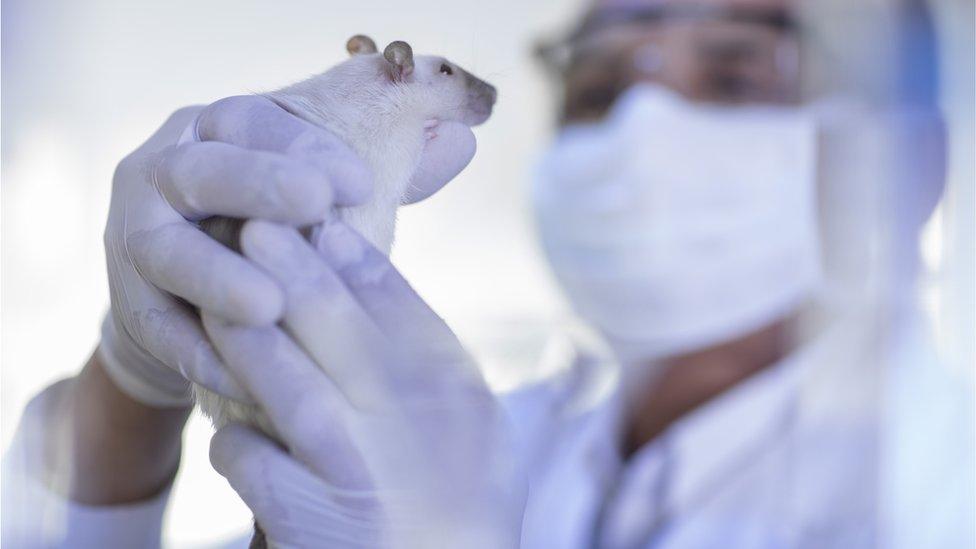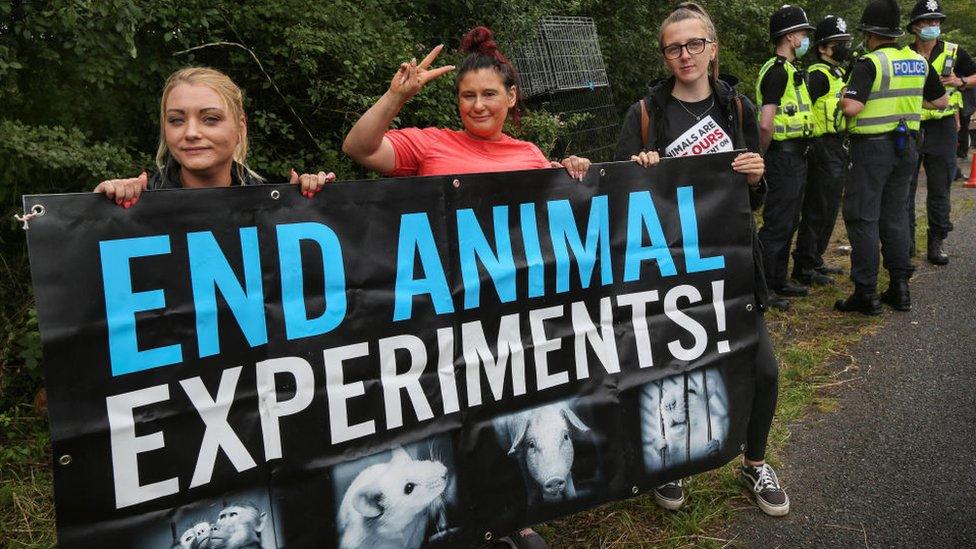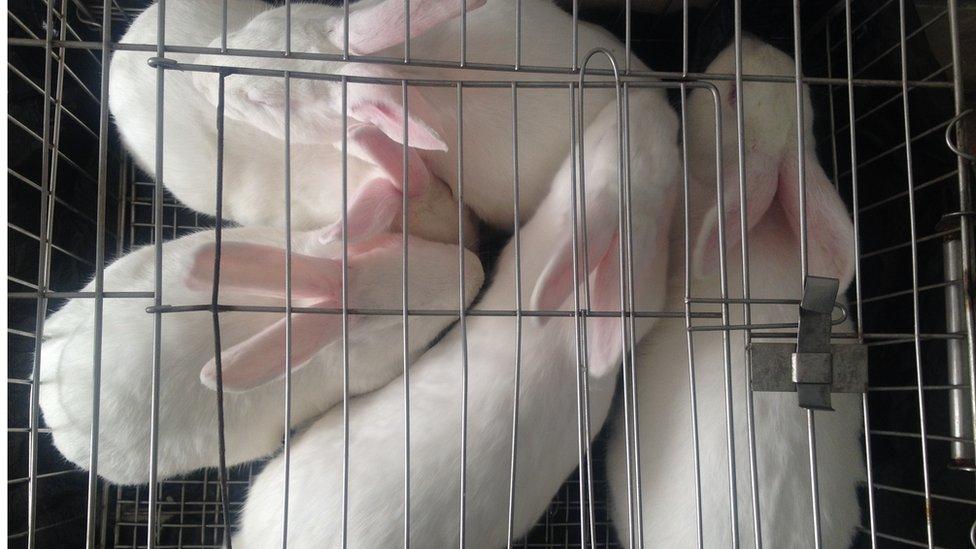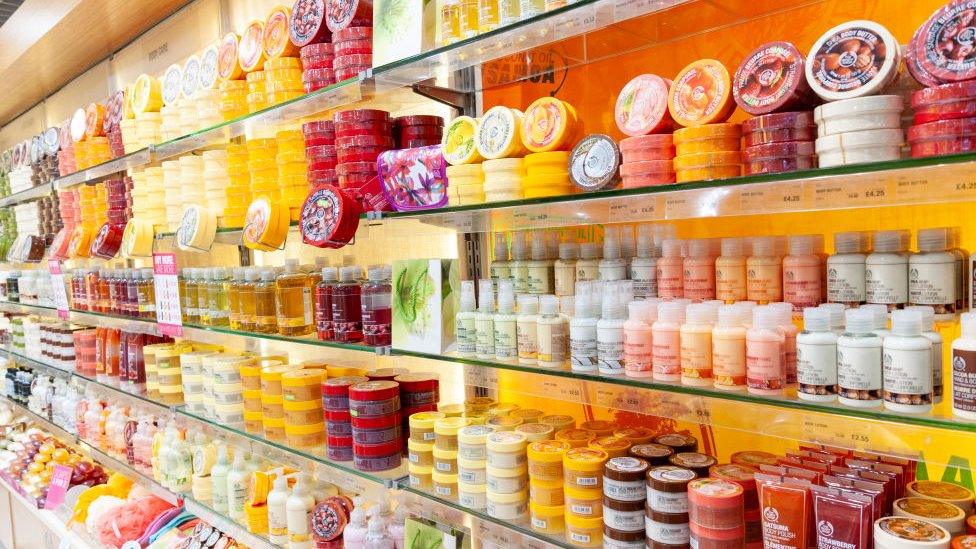Animal testing: What is it and why are people talking about it?
- Published
- comments

The government has allowed animal testing for some makeup ingredients to start again, despite a 25 year ban.
A ban against animal testing for makeup and its ingredients was brought in in 1998 and is still in place but the government says it has changed policy to match rules in the European Union (EU), a group of countries that the UK left in 2020.
The tests in question fall under EU chemical rules which state new chemicals need to be tested on animals to make sure they are safe for workers to handle.
This decision has been heavily criticised by animal rights group Cruelty Free International (CFI) and some major beauty and cosmetic brands.
Cruelty Free International said it was "outrageous", saying that the government had effectively lifted the ban.
The government says it hasn't changed the ban on testing cosmetic products like makeup, on animals. It says testing on animals of ingredients should be done only if there is no other scientific method possible and that it is "committed to the protection of animals in science".
What is animal testing?
What is animal testing?
Animal testing is when living animals are used in scientific research to test their reactions to how effective a medicine is or how safe a product is for people.
Testing on animals in the UK is legal but only allowed if the benefits gained from the research outweighed any animal suffering, for example when used to test medicines.
British law says a new medicine must be tested on two different types of animals - one a rodent and one a larger non rodent mammal - before being tested on humans.
Animal testing is also used for things like household cleaning products, agricultural chemicals and food additives.
About 3.06 million scientific procedures involving living animals were carried out in Great Britain in 2021.
This includes breeding animals as well as experiments.
The most common animals tested on are mice, birds, fish and rats.
Other animals that were used included guinea pigs, hamsters, rabbits, birds, goats, sheep and pigs.
Cats, dogs, horses and monkeys are classed as "specially protected species" - which means laboratories wanting to use them must show that no other species are suitable before they are allowed to use them.
What are the arguments for and against animal testing?

Campaigners like these say animals testing is cruel and unnecessary
Campaigners who are against animal testing say the practice is cruel and inhumane.
They say that other methods now exist which means animal testing is not needed.
Not all testing on animals is successful and campaigners say they are ineffective because animals are so different to humans.
Many scientists and organisations which support animal testing argue that it is essential to test on animals to find out whether chemicals and medicines could harm humans.
They say that there are many biological similarities between animals and humans which make them effective test subjects.
They argue that animals testing has contributed to life saving cures.
Is animal testing banned in the UK?

Rabbits are some of the animals used in scientific testing
Animal testing generally is not banned in the UK, though it is illegal to use animals if there is another way of conducting research.
By law, new medicines must be tested on animals before being tested on humans.
Since 1998 there has been a ban against testing beauty products and cosmetics on animals.
The Royal Society for the Prevention of Cruelty to Animals (RSPCA), which has long campaigned against animal testing for cosmetic products, argues there are enough cosmetics products available, and thousands of existing cosmetics ingredients are accepted as safe.
It says there is no reason to cause animal suffering to develop more.
Have rules for animal testing for makeup changed?

The Body Shop was the first international beauty brand to campaign against animal testing in cosmetics
In 2020 the European Chemicals Agency (ECHA), an EU agency which oversees chemical regulation, ruled that companies needed to test some ingredients used in cosmetics on animals to ensure they were safe for the workers making the ingredients.
An animal welfare organisation Cruelty Free International bought legal action against the government accusing it of "secretly" abandoning the ban.
During the case it was revealed that some companies have been given licenses by the UK government to test on animals in order to manufacture cosmetics because of this EU rule.
The High Court rejected the challenge however and said although the government should have announced publicly a change of policy, it had not acted outside of the law.
More than 80 brands, including Body Shop and Boots have said they are dismayed by the government's decision.
The Home Office, the government department responsible, says there hasn't been a complete change of policy and it is still against the law to test cosmetic products on animals.
Christopher Davis, director of activism and sustainability at the Body Shop told the BBC they would "campaign" against the changes.
"Allowing animal testing for cosmetics would be a devastating blow to the millions of people who have supported campaigns to end this appalling practice," he told the BBC after the ruling.
